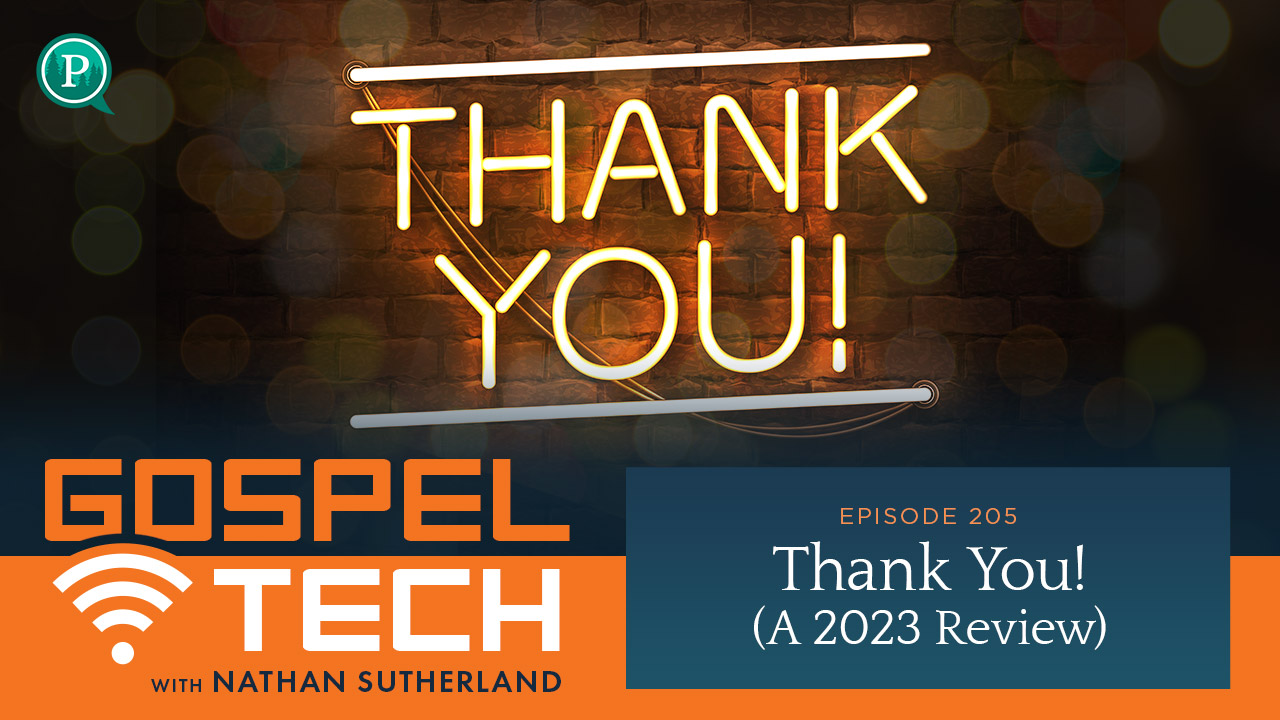This year has been so encouraging, thanks to listeners like you and the many other people and opportunities God has provided to help the work of Gospel Tech grow. Today’s episode is a quick overview of where God has taken us, what I’m excited about from this past year, and a few specific reminders we can take into the new year as we thank God for what he’s done, and what he’s doing.
Transcription:
Hello everyone, and welcome to the Gospel Tech Podcast. My name is Nathan Sutherland and this podcast is dedicated to helping families love God and use tech. Today we are doing our 2023 review. We did it. This is the last podcast episode of 2023. Just full disclosure, when I started this conversation in 2020, I definitely reached episode 10 and told Anna, “That was it. That’s all the words I have to say, so I guess we just tie a bow on it and send it out to the world.” So it’s still incredible to me that there are this many episodes.
I am excited for today, because we get to reflect on what the Lord has done, celebrate you guys being on this journey with us, and then talk about, I guess, where we’re looking towards in this new year, so let’s start with some celebration. In this past year Gospel Tech has grown as a ministry, which has been incredible. It’s grown because of the generosity of people like you, you sharing with people, telling people about this resource, inviting us into your churches, your schools, your organizations, your CC groups, and your willingness to engage this conversation and therefore direct how this conversation goes.
My goal is threefold. I always want to help you talk about healthy tech, equip, and communicate, so equip your children with and communicate the hope of the gospel, this idea that God saves sinners, and that should influence how we use our tech. And third and finally, to use tech from hope, not for hope. This idea that we are going to build hedges around our devices, our networks, our family, not because we’re scared of tech, but because we see the good there and we want to make sure we ingest just the good. We want to avoid the bad, and not just by staring at the bad and trying to avoid it all, but staring at the best stuff and using that on purpose, not for purpose.
So that’s what I’ve wanted to do. You guys helped me then decide how to do that, and I’ll get to more on that in a minute. But in this growth season, yes, the podcast has grown, which is awesome. We have grown with our partners. So if you’re listening to this and you’re like, “My, Nathan sounds especially stellar right now,” that’s because we have professional editors now, and partnership with Krista, I’ve mentioned before, a ministry here on the West Coast who does an amazing job sharing the gospel through radio and a number of other ministries including a high school and junior high out of Seattle, Washington. They have partnered… Well, I guess I’d say they partnered with me. No, I partnered with them. That’s the right way to say it, and have allowed me to use some of their incredible resources, so we now have professional editing on this. It’s not just Nathan trying to figure it out.
That frees me up to do more of the work that I am actually good at and really passionate about. While I don’t mind editing, it’s certainly not what keeps… Well, it does keep me up at night. It’s not what I get excited about, I guess, would be the more clear way to say it. So that’s an incredible partnership, but partnerships beyond that of Christian schools, certainly. We’ve seen the number of Christian schools around the United States that we’ve been working with growing, which is super fun. Word-of-mouth has been incredibly beneficial, where we’ll speak somewhere. I say we because the board and Anna are such a huge part of this, but I’m the only one actually speaking. So I speak somewhere.
We then as a group receive more information from referrals and people encouraging. So please, if you’ve been thinking, “Hey, we should probably get this Gospel Tech stuff out, let’s do that.” And we’ll talk about that with the 2024 piece. But in addition to that, it’s not actually just Gospel Tech. Due to popular demand, I guess, Flint and Iron has seen a massive resurgence. I have put a lot of effort into Gospel Tech to making sure this is a solid resource because I know that when churches bring us in, this is a resource they’re both hungry for and the families need and that can go a really long distance in bringing the gospel into a digital space, and I’m very passionate about that.
And yet, I continually get to do you do this in public spaces. So Flint and Iron has continued to stretch into more public schools and then into public corporations, including, at the time you’re listening to this it will have already happened, but one of the biggest tech companies on the planet offering an opportunity to talk to families about what does it look like to use tech on purpose, not for purpose. How do we raise our kids up on this? Because even though we’re not operating from the same scripture, we’re not using the same Bible verses to communicate God’s truth and love and hope, we have hungry parents who don’t know how to manage their own lives but want so much for their kids to have hope and to have purpose and to have joy and to have safety.
And we can take a lot of these truths. So I can talk about tool and tool tech, I can talk about reset, I can talk about hedges which are all biblically rooted and grounded, which are founded in this truth that your kid has a purpose, and this tech can distract that or it can build it. The tech does not give your kid a purpose, and none of these parents are confused about that. They understand. They’re like, “Oh no, my kid isn’t meaningful because they have this device, they’re meaningful and I want to make sure that device adds to it doesn’t distract from it.” That to me is a huge win and that is something I’m excited to continue doing.
My prayer and my request to you as listeners would be please pray as I go into those spaces. I do not want to simply become a voice who says, I don’t know, kind of rote pablum just fills the space with words that make people feel good in order to make them feel good. I want to bring light into dark spaces. For example, I spoke this week to a bunch of middle school and high schoolers in a local public school district, and a bunch like did five talks. And in those conversations, I don’t use the word sin. I don’t use necessarily the word forgiveness, but I absolutely address it.
We talk about search history, we talk about digital footprints, we talk about conversations that I’ve had with young people who have made mistakes, including one young man who earned a felony through the internet and yet he isn’t a felon. That’s not how God sees him, but he is a kid who’s now, that part that describes him. It doesn’t define him. But that conversation of redemption and what choices are you making and is it lining up with who you’re being called to be your purpose? It does click. You can watch it hit in a group where you’ve never brought up a Bible verse and you’ve never brought up any specific biblical truths, and yet the same God who called me and you is calling each of them.
And so that’s why I’m so excited to see Flint and Iron growing into spaces that I didn’t aim it there because I don’t… Anyway, I don’t know that I could have done it without enough marketing. And at some point your marketing has to become so distorted and distant that I would be disingenuous to market it one way and deliver it the way I actually want to deliver it, and instead it’s being requested. And that’s incredible. Now we’ll see if I get invited back to this corporation or to other big groups, but the point is the conversation is wanted. There are parents who are hungry for it, so that’s exciting. That to me was unexpected.
We’re putting a lot of emphasis on the Gospel Tech side, and it’s cool to see that grow. It was really cool to see that grow to the point where people who are like, “Hey, this space doesn’t even have the words to handle the gospel side of the conversation. They don’t know words like sin and salvation and redemption, but they’re hungry for truth. And could you bring that part of the conversation.” And my prayer and as I asked for you already is for you to continue to pray, please, as well that this conversation stays hopeful and hope focused. That it doesn’t become about Nathan being smart enough or tips for tech, but instead it continues to turn the dial on, “Hey, your kid’s got a purpose. Where’s the purpose coming from? Hey, your kid has potential. What does that actually mean? Is the best thing for your child simply to be successful, or can you become successful and miss your potential?” And that’s the conversation I want to have so, so much in any space I go. So thank you for helping me do that and that’s been a super cool part of this year.
All right, so then as we look towards this coming year, oh actually I’ve mentioned very early on that you helped steer the ship as far as how we had the conversation. Every one of these conversations is going to talk about healthy tech, communicate gospel, operate from hope, not for hope, using tech on purpose, not for purpose because I know who I am in Christ as a new creation, not because I’m looking for it.
All right, so then I went and looked through, all right, what were the most listened to episodes? And you guys are all over the board. This is why if you’re like, “Nathan has an eclectic mix of topics he addresses,” this is why. Top five. Smartphones, make sense. What tech will be there when Jesus returns was number two. Yes, the eschatology of technology conversation was number two. Come on listeners. I was excited to see that. Number three was Christian video games with Brent Dusing of TruPlay Games. If you haven’t checked him out, check out TruPlay Games. It’s a super cool idea of how do we make Christian video games, not just ones that tell Bible stories. Again, they’re looking to reach a wider audience, but all of them are undergirded with biblical truth and hope and these are my words not theirs. So I want to be very clear, but I see them as kind of the Veggie Tales of video games.
Kids are already there. They’re already watching something. They’re already playing something. They’re already doing something. How can we make sure we get something in front of them that speaks truth, that God’s already speaking through sunrises and sunsets and each new morning and the breath in our lungs. Why not have video games speak some of those truths too? Check out Brent Dusing. You guys liked it.
Nerd Dads, not the most recent series by the way, going all the way back to Justin Pavey. I think it was in April. We had a conversation that was kind of the initial started to percolate. We do about one a year and that kind of started to stir up the how do we talk about Nerd Dad’s conversation. That was number four. Number five was does tech help us love God? Well, which if you were going to get a summary episode for everything we talk about here, that would be it. So thank you for listening. Those are the top five episodes for this year.
And I was going to try to give you a best of, and then I read them and I was like, “There’s no way to make all five of those work in a single episode. Are you kidding me?” Just the eschatology of technology doesn’t play well with others. But let’s be clear, we are using tech on purpose because of who God has called us to be and what he’s called us to do. We are called to be followers of him, to love our neighbors as ourselves, to love God with all our heart, soul, mind and strength, and help others do the same. In that, tech can be a use. That’s where our hedges come in that we protect our devices, our network, and our family to help them understand where tech lines up with who God’s calling them to be and where it’s a diversion or a distraction from it. Not so that we can do it perfect, but so that we can repent quick and get back on track. So that has been a huge blessing for this year too, to see kind of what is helping and encouraging families.
And third and finally is this coming year. As we look forward to this year, if you got our year-end letter, if you’re on our email chain, that doesn’t sound right, list is the word I should use. If you’re not, you can sign up at gospeltech.net, under resources, I believe is where you enter your email. But we are this next year, have two projects coming out. Anna’s book is very done. I always say her title wrong, so I want to look at it here. Okay, the Graceful Disconnect, and it’s a 25-day journey to help moms regain hope and focus in a overwhelming tech world. So I’m super excited for that, having been able to read it. Anna is truly a gifted writer, and I’m excited for her to bless people with that.
That’s not just husband hype because I also wrote something. And I can tell you, writing is a work of love for me. It is. I trust the Lord is going to use it. The Gospel Tech book is also coming out. Both of these are coming out quarter one, so sometime January, February, March, hopefully January, February depending on type setting and cover and all that stuff. But these books are rolling, and that is again, because of donor support, because of people believing us. We had a donor step forward and help us with the actual, some of the publishing cost of getting this ball rolling, which is awesome in terms of editing and some of the other pieces, buying the first books that come out to be able to get into the hands of some of our listeners and followers. So we are super, super excited for those because that’s a brand new chapter.
I thought I was going to start the nonprofit with a book. I sat down in a coffee shop for 10 straight days and tippity-tapped that book out. And I’d had all of this information, and that was like 2017. And it wasn’t this book, it was the kernel of this book, but God’s been so, so good. So I’m excited for you guys to read that. I’m really excited for you to read Anna’s book and excited for what that means. It means that the Lord has got us to a spot where we actually had enough life experience that we can now encourage families in text, even if I can’t make it there physically, even if they can’t watch a video, a book can now go to them or be shared with them. And that is an incredible opportunity, so thank you for doing that.
As we look into 2024, there’ll be a kickoff episode where I’ll talk a little more about our vision for the year. But what I would ask of you is please continue to pray for us. Pray that God opens doors, certainly, but pray that we stay the course and stay on track. With the opportunities we’re given, there’s lots of good we can do, and yet we’re only called to a little bit of it, and we want to be really, really faithful. We being Anna, myself, and the board. We want to do an excellent job with the opportunities we’re given, and thank you so much to everyone who’s helping us do that.
Would you consider passing us along to another resource? Right now we have 14 organizations who have said, “Nathan, we want to bring you in and we just don’t have dates yet.” That’s awesome. Love that. I would love to continue to grow that number because we want to continue to get this resource out. What we’re finding is this is a stepping stone for the conversation. This isn’t Nathan comes once and the conversation’s over. It’s Nathan comes once and now it feels concrete enough that we can start this conversation as a church.
And that is again, something the two books are supposed to help as well, is when Nathan walks out the door, what can we still use as this resource in addition to the podcast and the online workshop? That’s where that is. So please consider and pray about bringing us in. Even if you work in a public organization, we work with Benevity, and we can take donations through that, and it is a way we can bless people with Flint and Iron resources as well.
Third and finally, consider supporting us financially. If you do, thank you so much. If you haven’t yet and you find this ministry of blessing, you can go to gospeltech.net/donate and check it out there. We are part of Flint and Iron, a 501(c)(3) nonprofit focused on sparking positive purpose in the youth. So that is why I speak to parents is because I want to see these young people reach their full potential. That’s my goal in teaching. That’s the goal in starting the nonprofit, and that’s my goal in communicating the gospel so clearly is I truly believe that is where young people are going to find their true and whole purpose is knowing their true and whole savior in that process.
So I hope that this laid out a little bit of this last year and was encouraging to you because you’ve been a massive part of this journey. I hope that you will continue to listen and share these resources and join us in 2024, that’s crazy to say, as we continue this conversation about how we can love God and use tech.
Follow this podcast:







